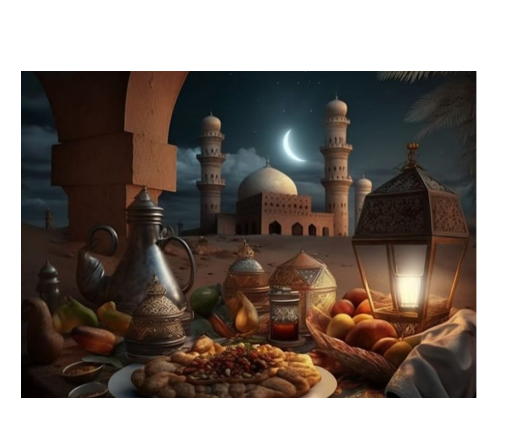Fasting
Fasting, which literally means abstinence, is defined as being abstinent from certain acts from the break of dawn until sunset. It is also an obligatory act of worship stressed upon every believer during the month of Ramadan. Fasting is a means to piety, as Allah Taala mentions in the Quran:
“O ye who believe! fasting is prescribed to you as it was prescribed to those before you, that you may (learn) self – restraint” (Al Baqarah – 183).
This implies that if someone could stay away from food and drink for the sake of Allah Taala, it becomes easy for him to abstain and stay away from things which are prohibited. Fasting increases the piety and Taqwa towards Allah, allowing us to fear his punishment. It also builds up sincerity, as Allah says in the Hadith Qudsi: ‘Every good deed of Adam’s son is for him except fasting; it is for Me. and I shall reward (the fasting person) for it.’
This is a proof that fasting increases the sincerity and truthfulness of a believer, which is a matter between only himself and his Lord. It also increases gratitude, making a person more grateful for the bounties he had been receiving throughout. Fasting also extinguishes the sins a person committed and keeps him away from the Hellfire and the punishment of the grave. Likewise, it protects the fasting person from the evil of Shaitan and the worldly distractions.
There are huge number of merits for the fasting person such as achieving self-control and patience, and earning the pleasure and unconditional love from Allah, great rewards in the hereafter, and a special heaven called Ar-Rayyan exclusively for those who fast.
Ramadan
The month of Ramadan is considered the best in the Islamic year due its numerous benefits, merits and blessings. It is the month in which fasting is obligatory. The prophet (p.b.u.h) said, “The master of the months is Ramadan”.
This month is very special because the Quran was revealed in it. Allah says in the Quran:
“Ramadan is the (month) in which was sent down the Quran as a guide to mankind, also clear (signs) for guidance and judgement (between right and wrong)” (Al Baqara:185).
Also, it was reported that the prophet (p.b.u.h) said that the earlier scriptures like that of Ibrahim, the Torah, and the Gospel were also revealed in the holy month of Ramadan.
Moreover, it is said that in the month of Ramadan, the gates of beneficiation are opened, and the gates of evil are closed, i.e., the gates of heaven are kept open while the gates of hell fire are closed.
This holy month even consists of (Lailat-ul-Qadr) the night of power– the night in which the holy Quran was revealed to the prophet (p.b.u.h). Allah Taala mentioned the speciality of this in the Quran:
“We have indeed revealed this (Message) in the Night of power; And what will explain to thee what the night of power is? The Night of power is better than a thousand months. Therein come down the angels and the spirit by Allah’s permission, on every errand: Peace!.. This until the rise of Morn” (Al Qadr: 1-5)
The good deeds done during this month are rewarded abundantly. All the obligatory and voluntary prayers offered as well as all other acts of worship will be rewarded with divine bounties during this holy month.
The Sunnahs in Ramadan
If we want to spend the month of Ramadan just like the prophet (p.b.u.h) did, we will have to follow his Sunnah.
First of all, we should not skip the Suhoor because the prophet (p.b.u.h) said, “Take suhoor, for in suhoor there is blessing”. (Al – Nasai)
We are recommended to have a whole meal in this pre-dawn time to gain enough energy to stay fit throughout the day. Similarly, we shouldn’t be lazy in having Iftar. He (p.b.u.h) asked us to hasten in breaking the fast after an entire day of not eating and drinking for the sake of Allah. And it is preferable to eat something before leaving for maghrib prayers, then have a light dinner afterwards preventing overeating.
Second, the prophet (p.b.u.h) had stressed on the importance of Tasbeeh and calling on Allah especially in Ramadan: He said, “…saying tasbeeh in it is better than saying a thousand tasbeehs at other times”. (Al-Tirmidi)
He (p.b.u.h) also mentioned that Allah loves those who ask from Him, so we should make frequent dua during this time to increase the rewards in quantity and quality.
Third, the prophet (p.b.u.h) used to offer night prayers (Taraweeh) during Ramadan. He said, “ whoever prays during the night in Ramadan out of sincere faith & seeking its reward from Allah, will have all of his previous sins forgiven.”
Therefore, we should try to engage in more night prayers like Taraweeh and Tahajjud as the prophet (p.b.u.h) prescribed.
Fourth, we should strive to do good deeds and stay away from bad ones. For example, the prophet (p.b.u.h) recommended us to engage in charity giving. If we want to gain the maximum reward like the prophet did, we should be more generous and try to keep the actions secret. On the other hand, he discouraged having bad manners, using foul language and being angry during fasts as they will decrease the fast’s reward and may nullify it.
Fifth, the prophet (p.b.u.h) emphasized the importance of the last 10 days of Ramadan. He used to spend the whole night worshipping Allah and performing Itekaf at the masjid. The prophet also recited, studied and taught the Quran during Ramadan. Similarly, we should also study the Quran and reflect upon it as well as engage in obligatory and voluntary acts of worship more frequently.
Finally, we must spend Ramadan in an efficient manner and strive to continue the acts of Ibadah throughout the rest of the year to achieve success in this life and the next, in sha Allah.
Written By: Zahra Rahman





